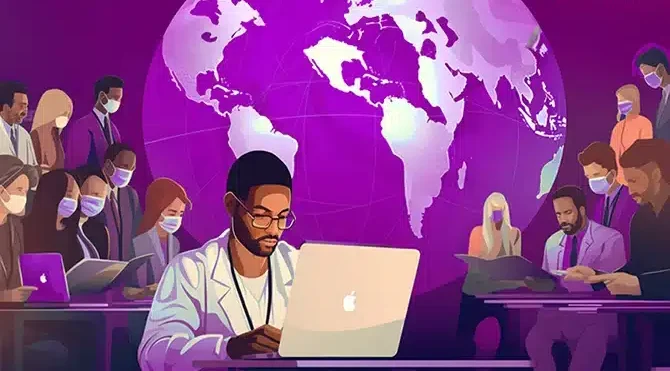
TL;DR – Learn how improving digital literacy, technology, and analytics is essential to achieve health equity in telehealth.
The COVID-19 pandemic increased the usage of telemedicine communication in a range of healthcare settings, although the concept is not new and has been implemented in numerous organizations and health systems. Because effective coordination of the management of chronic diseases depends on maintaining continuity of care, telehealth utilization in primary care was especially crucial.
Did You Know?
91% of people claim that telemedicine can help them keep up with their doctor's appointments, maintain their refills, and follow various protocols recommended by their doctors
This blog aims to examine the key characteristics, treatment workflow aspects, and obstacles to the adoption of telemedicine in healthcare.
Telemedicine is described as a healthcare provider who diagnoses and treats patients remotely. By increasing the likelihood of follow-up and enhancing doctor-patient communication & effectiveness, using health apps for scheduled follow-up visits lowers the number of missed appointments and improves patient outcomes.
Telemedicine technologies enable patients and physicians to review the course of treatment together. It should be noted that telemedicine is not a replacement for in-person consultations; rather, it is an addition to them.
| Benefits | Challenges |
|---|---|
| Effective Omnichannel Patient Experience - Telehealth encompasses a broad spectrum of methods and areas of expertise, facilitating effective healthcare communication between patients and healthcare providers via telephone, email, video calls, web-based meetings, the online realm, and distant equipment. | Patient Privacy and Confidentiality - As opposed to in-person appointments, telemedicine encounters are prone to different privacy and security issues. |
| Adoption of Advanced Technologies for Patient Ease - The services available through telehealth include medical education, remote patient monitoring, patient consultations conducted via videoconferencing, wireless health applications, and the conveyance of medical images and reports. | Data Accuracy and Misdiagnosis - An additional obstacle to the successful implementation of telehealth is the reliability of data transmission. This can lead healthcare providers to make treatment decisions and suggestions using potentially erroneous patient information when they are unaware of disparities in technology systems. |
The pandemic has permanently changed the way healthcare is delivered, with practically all healthcare providers adopting telemedicine rapidly. Telemedicine has improved how healthcare providers can expand access to care without physically being there. Healthcare professionals can now treat many patients without being physically present. Furthermore, now that it has proved its value, it will surely be around for a long time. Although healthcare providers were introduced to telehealth through basic video conferencing, the upcoming wave of telemedicine technologies will offer much more.
Providers and insurers are currently debating how to strike a balance between in-person and telehealth, with a particular emphasis on reimbursement models and logistical considerations.
The concept of telehealth as a neutral space refers to the idea that telehealth can provide a safe and neutral environment for patients to receive care. This holds particular significance for patients who might experience discomfort or stigma in conventional healthcare environments. Additionally, telehealth can be a solution for reducing care barriers, such as transportation and mobility challenges, by providing patients with the opportunity to access care from their own homes.
In addition to providing contactless healthcare, telehealth makes routine healthcare more convenient, provides access to specialty care, and enables more thorough regimen monitoring. It's crucial to unlock the potential of telemedicine to advance health equity while ensuring solid patient-doctor relationships.
For the telehealth revolution to realize its full potential, partnering with historically marginalized racial and ethnic groups must be a top focus for those devising and implementing telehealth solutions. This is to guarantee that solutions are created to be functional and accessible to everyone. It is imperative to ensure that no one is left behind, as telehealth continues to rapidly advance.
Contact us at [email protected] to enhance your overall patient experience. We can help you put into practice suitable AI solutions that meet your distinctive goals and objectives.










